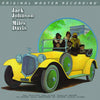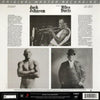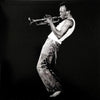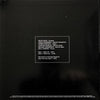







Miles Davis - A Tribute to Jack Johnson (Ultra Analog, Half-speed Mastering)
ORDER LIMITED TO ONE ITEM PER CUSTOMER
Miles Davis – trumpet [click here to see more vinyl featuring Miles Davis]
John McLaughlin – electric guitar [click here to see more vinyl featuring John McLaughlin]
Herbie Hancock – organ [click here to see more vinyl featuring Herbie Hancock]
Michael Henderson – electric bass
Steve Grossman – soprano saxophone
Billy Cobham – drums
Brock Peters – narration
1 LP, gatefold jacket
Limited numbered edition
Original analog Master tape : YES
Half-speed Mastered
Gain 2™ Ultra Analog
Heavy Press : 180g
Record color : black
Speed : 33 RPM
Size : 12'’
Stereo
Studio
Record Press : RTI
Label : MOFI
Original Label : Columbia Masterworks
Recorded February 18 and April 7th 1970, at Columbia Recording Studios B, New York City
Engineered by Arthur Kendy
Produced by Teo Macero
Remastered by Krieg Wunderlich
Originally released in 1971
Reissued in 2015
Tracks:
Side A :
- Right Off
Side B :
- Yesternow
Reviews :
"If you have never experienced this staggeringly creative moment in Miles Davis's (and producer Teo Macero's) art played loud, with absolute clarity and unfettered transient-prowess, you might have only a partial understanding of what a god-walking-the-earth Miles Davis was. I am currently obsessed with this delirious musical construction because it reminds me that in order to make art at the highest levels, one must first give oneself permission to emancipate and explore the uncharted." Stereophile
"None of Miles Davis' recordings has been more shrouded in mystery than Jack Johnson, yet none has better fulfilled Davis' promise that he could form the "greatest rock band you ever heard." Containing only two tracks, the album was assembled out of no less than four recording sessions between February 18, 1970 and June 4, 1970, and was patched together by producer Teo Macero. Most of the outtake material ended up on Directions, Big Fun, and elsewhere. The first misconception is the lineup: the credits on the recording are incomplete. For the opener, "Right Off," the band is Davis, John McLaughlin, Billy Cobham, Herbie Hancock, Michael Henderson, and Steve Grossman (no piano player!), which reflects the liner notes. This was from the musicians' point of view, in a single take, recorded as McLaughlin began riffing in the studio while waiting for Davis; it was picked up on by Henderson and Cobham, Hancock was ushered in to jump on a Hammond organ (he was passing through the building), and Davis rushed in at 2:19 and proceeded to play one of the longest, funkiest, knottiest, and most complex solos of his career. Seldom has he cut loose like that and played in the high register with such a full sound. In the meantime, the interplay between Cobham, McLaughlin, and Henderson is out of the box, McLaughlin playing long, angular chords centering around E. This was funky, dirty rock & roll jazz. The groove gets nastier and nastier as the track carries on and never quits, though there are insertions by Macero of two Davis takes on Sly Stone tunes and an ambient textured section before the band comes back with the groove, fires it up again, and carries it out. On "Yesternow," the case is far more complex. There are two lineups, the one mentioned above, and one that begins at about 12:55. The second lineup was Davis, McLaughlin, Jack DeJohnette, Chick Corea, Bennie Maupin, Dave Holland, and Sonny Sharrock. The first 12 minutes of the tune revolve around a single bass riff lifted from James Brown's "Say It Loud, I'm Black and I'm Proud." The material that eases the first half of the tune into the second is taken from "Shhh/Peaceful," from In a Silent Way, overdubbed with the same trumpet solo that is in the ambient section of "Right Off." It gets more complex as the original lineup is dubbed back in with a section from Davis' tune "Willie Nelson," another part of the ambient section of "Right Off," and an orchestral bit of "The Man Nobody Saw" at 23:52, before the voice of Jack Johnson (by actor Brock Peters) takes the piece out. The highly textured, nearly pastoral ambience at the end of the album is a fitting coda to the chilling, overall high-energy rockist stance of the album. Jack Johnson is the purest electric jazz record ever made because of the feeling of spontaneity and freedom it evokes in the listener, for the stellar and inspiring solos by McLaughlin and Davis that blur all edges between the two musics, and for the tireless perfection of the studio assemblage by Miles and producer Macero." AllMusic Review by Thom Jurek
Ultra Analog™ : The GAIN 2 Ultra Analog™ Series stems from the use of the Gain 2 system, mastered at half speed from the original master tapes where possible, capturing and uncovering as before undiscovered sonic information.
Half-speed mastering. In half-speed mastering, the whole process is slowed down to half of the original speed. A typical 33 1/3 rpm record is cut at 16 2/3 rpm. The source material is also slowed down (reducing the pitch in the process) meaning the final record will still sound normal when played back. Slowing the whole process down allows more time, which means the end result sounds better and is more efficient — allowing engineering to minimize the effects of inherent limitations within the vinyl format. The result is a more accurate and more open high-frequency response in the half speed vinyl when compared with a normal speed recording.
Ratings :
AllMusic : 5 / 5 , Discogs : 4,64 / 5


